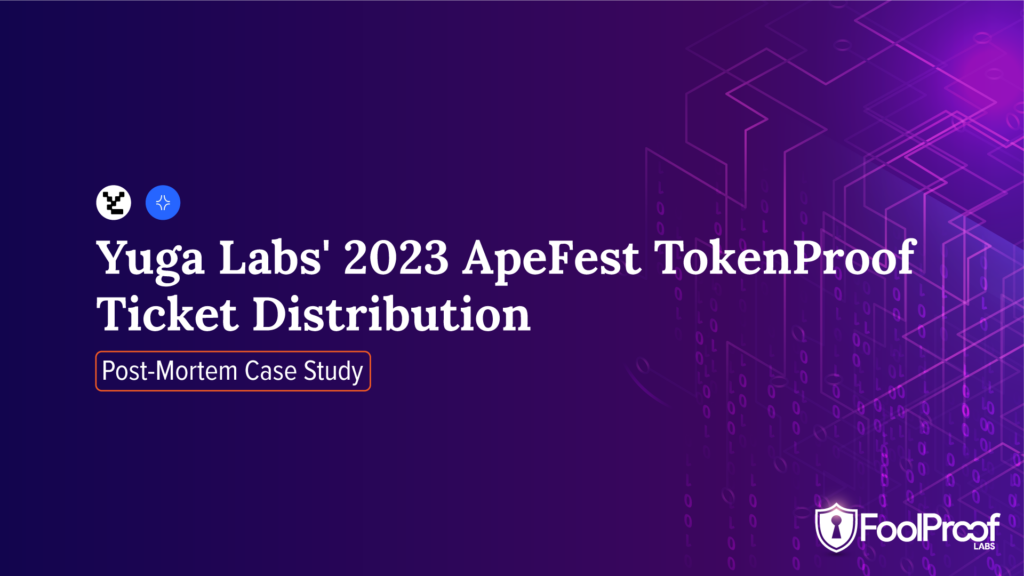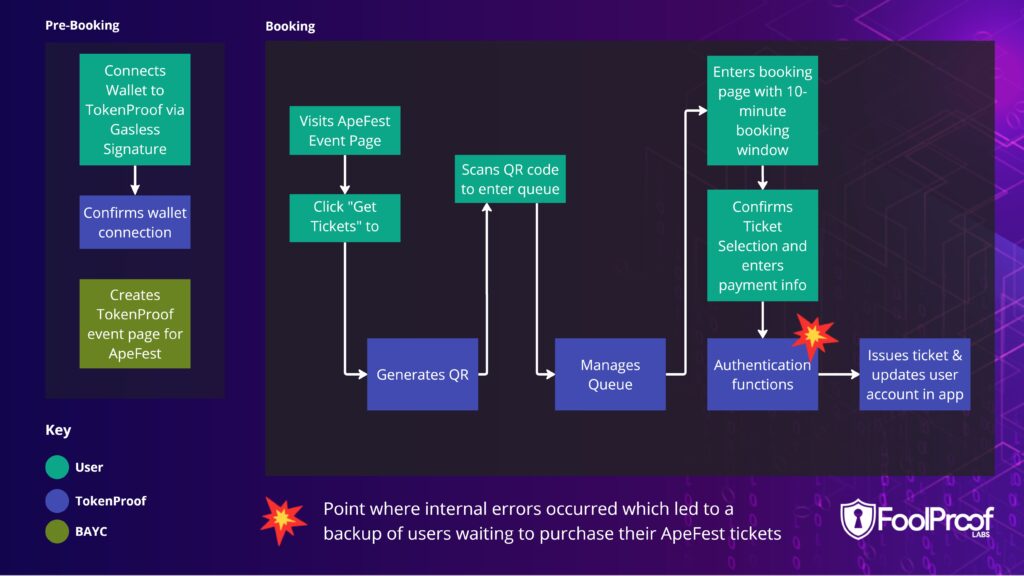
The BAYC ApeFest TokenProof ticket distribution incident serves as a critical case study in the evolving world of blockchain technology and its integration with real-world applications.
Anticipation for the event was met with a series of challenges, including technical glitches, communication oversights, and potential overlaps with traditional “web2” technologies. These hiccups not only disrupted the ticketing process but also cast a shadow on the broader trust and credibility of web3 platforms.
Through an in-depth timeline review, analysis of underlying and existential issues, and a dive into the root causes, this post-mortem seeks to unravel the intricacies of the incident.
The narrative underscores the imperative need for transparency, technical robustness, and the nuanced blending of web2 and web3 as we navigate this digital frontier.
Incident Timeline: Apefest Tokenproof Ticket Distribution
Pre-Incident:
July 13: BAYC announces ApeFest, mentioning Tokenproof as the official verification platform for apefest.
July 24: Tokenproof and BAYC provide advanced information about ticketing. Tokenproof emphasizes ‘delegate cash’ and ‘warm wallet’ options, highlighting potential nuances.
July 25: Fonz assures the community that the ‘warm wallet’ and ‘delegate’ options have been thoroughly tested with Tokenproof.
Day Of Incident – July 26, 2023
- 8:00 PM EST: Ticketing commences.
- 8:03 PM EST: @_NFTs appears to be the first to report the issue.
- 8:07 PM EST: Fonz acknowledges “authentication issues.”
- 8:13 PM EST: Fonz advises attendees to update their app.
- 8:33 PM EST: Fonz calls for patience and assures those who received confirmations.
- 9:27 PM EST: BAYC suspends ticketing due to mass authentication issues and promises updates.
- 9:30 PM EST: Fonz reassures apes, indicates efforts to diagnose the situation.
- 10:16 PM EST: Fonz provides initial insight, mentioning limiting ticket selections once systemic issues became apparent.
- 10:20 PM EST: Fonz hints at infrastructure challenges and mentions the authentication service timed out.
- 11:44 PM EST: Fonz provides a detailed explanation about long API calls during authentication and the subsequent cascade of issues.Mentions how several calls have to subsequently be made. These calls involved checking for apes, delegation, staking, and collateralization, as well as querying the entire contents of the users wallet (even non-collection specific items).
Resolution
Aug 1: BAYC reveals the rescheduled ticket claim date for Aug 3, 10 AM EST.
Aug 3: Ticketing reopens, with little to no reported issues or hype post-launch.

Apefest Tokenproof Ticketing Incident Root Cause Analysis
With Tokenproof being closed-source, deriving conclusive insights is challenging. However, according to the TokenProof documentation and the social media posts made by Fonz, Yuga, and TokenProof we can infer the following:
- Cumbersome API calls during the authentication process, amplified by the layered verifications, leading to timeouts and other errors.
- Infrastructure that wasn’t geared for such massive, simultaneous demands.
Apefest Tokenproof Ticketing Incident Underlying & Existential Issues
Technical Flaws & Infrastructure Limitations:
The incident’s core reveals Tokenproof’s inability to effectively manage web3 transactions, especially in high-demand scenarios. Signs point toward an over-reliance or blend of traditional “web2” technologies/methodologies in an environment where web3 solutions were critical. As challenges arose, the platform’s inability to scale dynamically became evident, forcing restrictions on user access.
Communication and Transparency:
Despite best efforts to keep the community updated, the communication felt short, leading to confusion and ambiguity. Compounding the issue, Tokenproof’s proprietary nature rendered much of its operations opaque, leaving users and stakeholders to speculate and leading to seeds of mistrust.
Trust, Credibility, and Web3 Adoption:
Disruptions, particularly in high-profile, high-stakes situations like ApeFest ticketing, can shake the foundational trust in web3 platforms. The issues faced have the potential to cast doubt on web3’s maturity and raise questions about its readiness for mainstream, large-scale adoption.
The Web2.5 Balance:
The ApeFest incident brings forth a critical question for the evolving digital landscape. Should the tech world push for purely web3 solutions, or is there a viable (and perhaps necessary) place for hybrid models that utilize the strengths of both web2 and web3?
Recommendations
Embrace Web3 Holistically
Transition further into web3, ensuring that the platforms are finely tuned to handle its unique challenges.
Prioritize Transparency
Consider adopting a semi-open-source approach or, at minimum, transparent technical documentation. This would enhance stakeholder trust as well as set good standards and expectations for the industry as a whole.
Robust Testing
Engage in more rigorous pre-event stress tests and simulations. Platforms should be resilient to worst-case scenarios and unexpected user behaviors.
Conclusion
The ApeFest ticketing experience brought to light the complexities and intricacies of navigating the evolving web3 landscape. As Tokenproof sought to streamline the ticketing process, they faced unforeseen challenges, revealing the nuanced interplay between traditional web2 frameworks and the emerging web3 paradigm.
Clear and proactive communication emerged as a key theme. As the situation developed, the community’s response underscored the value of transparency and prompt updates, highlighting the importance of these facets in maintaining trust within a digital ecosystem.
Furthermore, the episode prompts reflections on the maturation journey of web3 platforms, urging innovators and developers to reflect upon readiness, scalability, and adaptability of such systems in real-world, large-scale scenarios.
Responding to the challenges, Tokenproof undertook swift measures to refine their systems. Within a few days of the incident, TokenProof was able to address the root causes of the issue and on August 3, 2023, they successfully navigated the ApeFest ticketing process. Events such as these provide the tech community with rich learning experiences, refining our understanding and approach towards the promising realm of web3.
